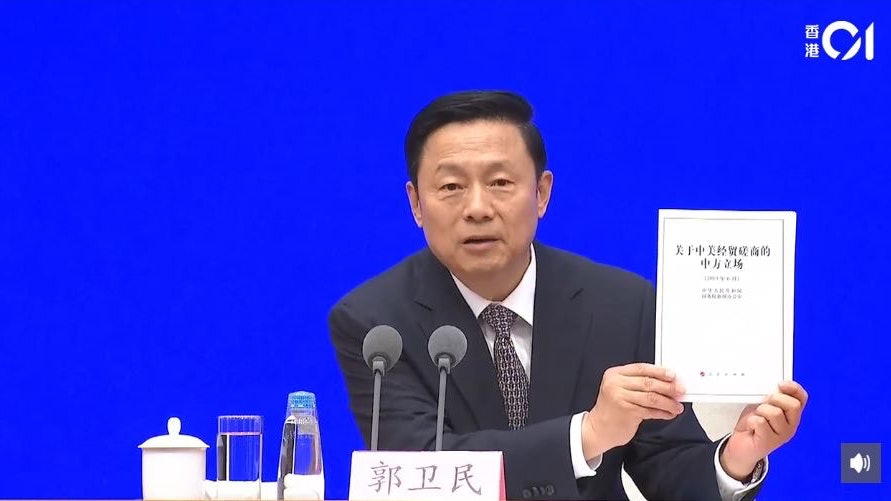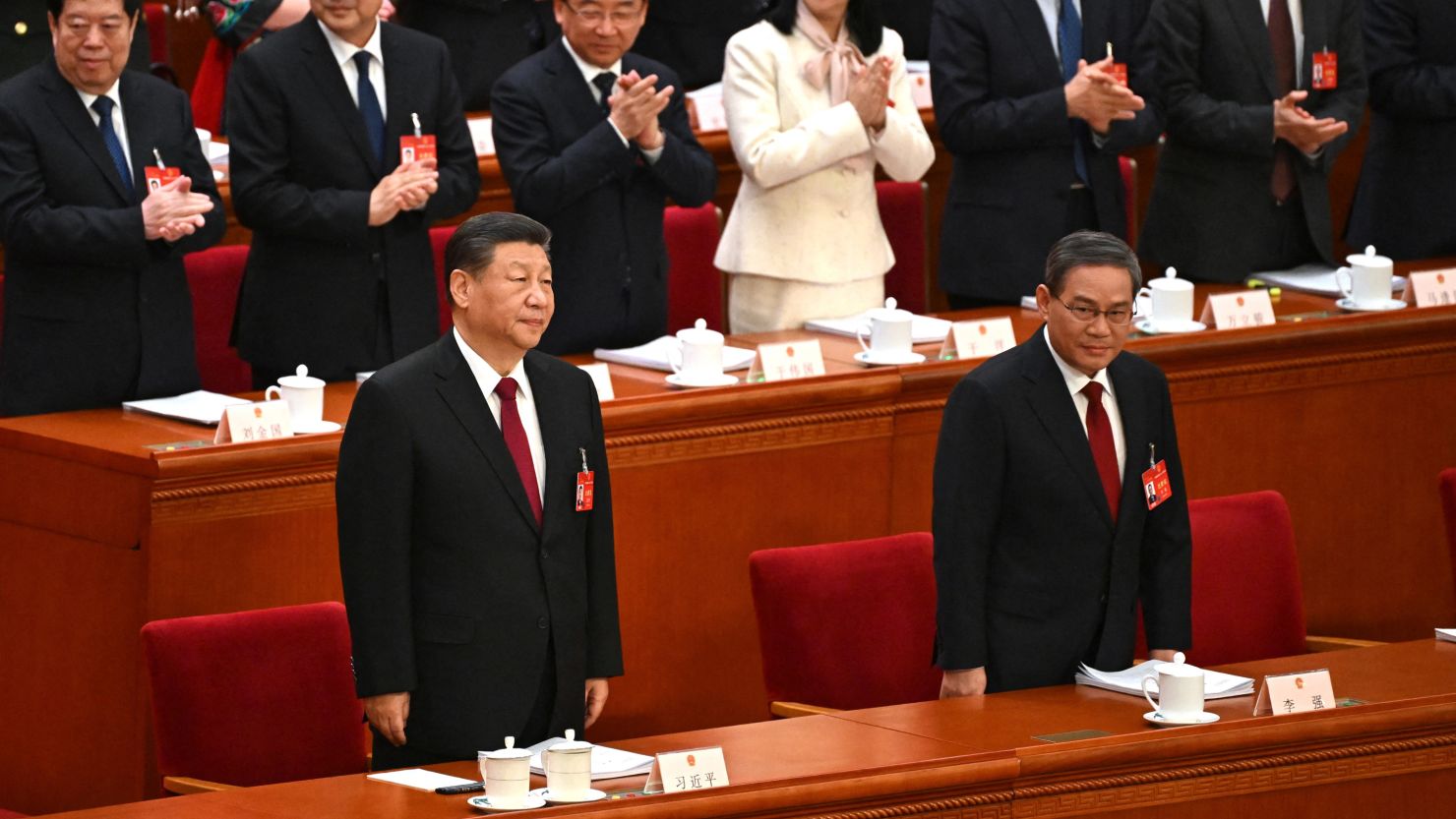On Sunday (June 2), the State Council Information Office issued a white paper on “China’s Position on China-US Economic and Trade Consultations.” The white paper pointed out that the recent announcement by the United States to increase tariffs on China is not conducive to resolving bilateral economic and trade issues. China strongly opposes this and has to respond to safeguard its legitimate rights and interests.
The white paper also pointed out that for the economic and trade differences and frictions between the two countries, China is willing to adopt a cooperative approach to resolve and promote a mutually beneficial and win-win agreement. However, cooperation is principled. Consultation has a bottom line. China will never give in on major issues of principle.
The full text of the White Paper on China’s Economic and Trade Negotiations is as follows:
Foreword
China-US economic and trade relations are the “ballistic stone” and “propeller” of the relations between the two countries. They are related to the fundamental interests of the two peoples and to the prosperity and stability of the world. Since the establishment of diplomatic relations between the two countries, bilateral economic and trade relations have continued to develop, cooperation areas have been continuously expanded, and the level of cooperation has been continuously improved. A mutually beneficial and mutually beneficial win-win relationship has been formed, which is not only beneficial to the two countries but also benefits the whole world.
Due to the different stages of development and economic system, the two countries will inevitably have differences and frictions in economic and trade cooperation. In the course of the development of China-US economic and trade relations, there have been many twists and turns and difficulties. In a rational and cooperative manner, the two countries resolved problems through dialogue and consultation, resolved contradictions, narrowed differences, and became more mature in bilateral economic and trade relations.
Since the new US government took office in 2017, it has threatened with the application of tariffs and other means, frequently provoking economic and trade frictions with major trading partners. Since March 2018, in response to the China-US economic and trade frictions unilaterally initiated by the US government, China has had to take effective measures to resolutely defend the interests of the country and the people. At the same time, China has always adhered to the basic standpoint of resolving disputes through dialogue and consultation, conducting multi-round economic and trade consultations with the United States, and striving to stabilize bilateral economic and trade relations. China’s attitude is consistent and clear. China-US cooperation is both beneficial, and fighting is hurting. Cooperation is the only correct choice for both sides. Regarding the economic and trade differences and frictions between the two countries, China is willing to adopt a cooperative approach to resolve and promote a mutually beneficial and win-win agreement. However, cooperation is principled. Consultation has a bottom line. China will never give in on major issues of principle. For the trade war, China is not willing to fight, not afraid to fight, and has to fight if necessary. This attitude has not changed.
In order to comprehensively introduce the basic situation of China-US economic and trade consultations and clarify China’s policy stance on China-US economic and trade consultations, the Chinese government has issued this white paper.
1. The United States has provoked economic and trade frictions against China to damage both countries and global interests.
The current US government pursues the “US priority” policy, adopting a series of unilateralism and protectionist measures, and using tariffs “big sticks” to impose its own interests and demands on other countries. In the United States, the “201 Survey” and “232 Survey”, which have been dusty for many years, have frequently used the major trading partners to disrupt the global economic and trade pattern. The United States will also target China in August 2017, launching the unilaterally strong “301 Survey” in August 2017, ignoring China’s unremitting efforts and achievements in strengthening intellectual property protection and improving the business environment for foreign investment over the years. He made many unobjective negative evaluations of China, adopted economic and trade restrictions such as increasing tariffs and restricting investment, and provoked China-US economic and trade frictions.
The United States ignores the economic structure of China and the United States, the characteristics of the development stage, and the reality of the division of labor in the international industry. It insists that China adopts an unfair and unequal trade policy, which has led to a trade deficit with China, and has suffered from losses in bilateral economic and trade exchanges. China has adopted unilateral tariff increases. In fact, in the era of economic globalization, the economies of China and the United States are highly integrated and together constitute a complete industrial chain. The economies of the two countries are ribbed, mutually beneficial and win-win, and it is miscalculated to regard the trade deficit as a “loss”. The US trade restrictions on China are not conducive to China, but also to the United States, and are not conducive to the world.
(1) The United States imposes tariff measures to harm others
The US government imposes tariffs on China’s exports to the United States, hinders bilateral trade and investment cooperation, and affects the confidence of both countries and the global market and the smooth operation of the economy. US tariff measures have led to a decline in China’s exports to the United States, which fell by 9.7% from January to April 2019 (Note 4), falling for five consecutive months. At the same time, since China had to impose tariffs on the US tax increase, US exports to China fell for eight consecutive months (Note 5). The uncertainty brought about by China-US economic and trade frictions has made the two countries’ companies take a wait-and-see attitude toward investment cooperation. China’s investment in the United States has continued to decline, and the growth rate of US investment in China has also dropped significantly. According to statistics from relevant Chinese authorities, Chinese enterprises directly invested US$5.79 billion in the United States in 2018, down 10% year-on-year (Note 6). In 2018, the actual US investment in China amounted to 2.69 billion U.S. dollars (Note 7), and the growth rate dropped sharply from 11% in 2017 to 1.5%. Due to the uncertain economic and trade friction between China and the United States, the World Trade Organization has lowered the global trade growth rate from 2.7% to 2.6% in 2019 (Note 8).











